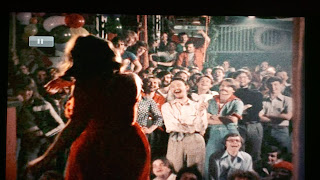As a child growing up with television, we didn't always have cable, or colour, but we always had a TV set and it was always on, marking time with program theme songs, some of which
signalled bedtime, others calling to me like a friend on the other side of the playground.
The CBS Evening News with Walter Cronkite was among the programs that beckoned, and I remember how the broadcast sometimes opened with a graphic in the top corner of the daily DEAD and MISSING American soldiers in Vietnam.
I cannot understate the effect the Vietnam War (or the American War, as the Vietnamese call it) had on my development. Even as a ten-year-old I had the sense that this war was a fiction cast with unprofessional actors trying to maintain a reality similar to what I experienced at my classmates' birthday parties, or saw out my bedroom window when the park across the street was suddenly alive with what I later learned was a rugby match. Once, when I asked my father what the War was "about", I was told of the physical properties of dominoes -- how if you stand them on their ends within a length of each other, you get "
an effect." As for my mother, she never gave the same answer twice.
As an undergraduate (1981-1986) I remember spending a Saturday in the UVic library reading (skimming) all I could on the Vietnam War. A book that often came up in bibliographies -- a book that was always referred to as "important" -- was Mary McCarthy's
Vietnam (NY: Harcourt, Brace & World, 1967), though when I googled "important books on the Vietnam War" yesterday afternoon it was not among the Herrs, Halberstams, Caputos and Hayslips. Last week, while walking back from the Save On, I peeked inside Susan and Sri's recently installed
front yard book exchange and, for the second time in my life, saw a copy of McCarthy's book.
Though only a 110 pages (the last four are blank), McCarthy's
Vietnam is crammed with remarkable observations made during the author's
New York Review of Books sponsored February 1967 visit. Most interesting to this reader, and perhaps most relevant to our current moment, is McCarthy's attention to language and rhetoric with respect to what then-
U.S. President Johnson referred to not as a war but as a "police action." Here is McCarthy on the difference between "honesty" and "truth":
It may be that the Information officers, whose job it is to give the reverse information ("How many of the residents have come back to Rach Kien?" Briefing captain: "Almost a thousand." Field major, half an hour later: "632"), are more honest, in a way, than the field officers who burst out with the truth. That is, the blunt colonels and sympathetic majors have not been able to realize that this is a war, unlike World War II or the Korean War, in which the truth must not be told, except when it cannot be hidden. Even then it must be turned upside down or restyled, viz., "the problems of success," which also comprised inflation. Those who lie and cover up are complicity acknowledging this, in some recess of their souls, while the outspoken field officer still lets himself think he is fighting the kind of war where an honest officer can gripe. (54)
Reading this passage recalled McCarthy's almost fifty year feud with
Lillian Hellman over their contrasting views of reality. Nora Ephron attempted to bring this to light in her play
Imaginary Friends (2002). For Ephron, McCarthy's problem with Hellman concerned Hellman's tendency to present fiction as fact, while Hellman's problem with McCarthy was McCarthy's presentation of fact as fiction. In 1980, Hellman sued McCarthy after the latter called her a liar on
The Dick Cavett Show, an action that backfired on Hellman after McCarthy's legal team uncovered so much damaging information on Hellman that her reputation never recovered.
Might we expect something similar after lawyers go after Donald Trump on January 21st, 2021, or will his indiscretions only make him stronger amongst those who believe (in) him unconditionally?




























